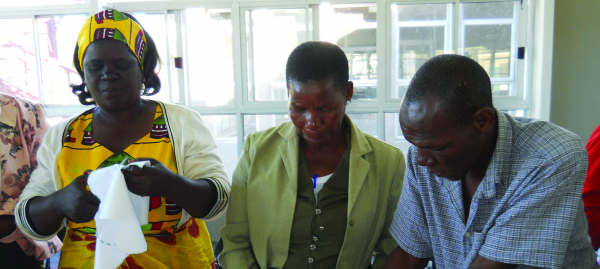
GOROMONZI — “I accompanied about 50 women to Harare for a re-usable sanitary pad making training workshop only to find myself as a participant. It is the time for other men to venture into re-usable sanitary making projects and help our female candidates in ensuring that every woman has access to affordable,” 50-year-old Tichafa Mashumba said.
BY JAIROS SAUNYAMA
Mashumba, from Musungate Village in Juru, is one of the few men from Goromonzi North who have defied odds and join the women in the constituency in the re-usable sanitary pad project that is meant to ensure that every vulnerable girl in the rural area has access to hygiene ware.
Recently, over 60 women underwent an intensive sanitary making workshop and are expected to pass on the skill to other women back in the villages.
The workshop was facilitated by Goromonzi North aspiring candidate Ozias Bvute who a few months ago purchased a lot of sewing machines for the project.
Austina Metsi (54) from Gutu Ward said sanitary pads were a problem, especially to vulnerable young girls who cannot afford to buy from the supermarkets.
“We are happy that as women we have another problem solved. It is a reality that a number of girls are struggling to purchase sanitary pads and this project will go a long way in alleviating the problem. A group of 10 women will see each woman making 10 pads before passing a sewing machine to another group,” she said.
“These re-usable sanitary pads will be sold within the area and if the project reaches every woman, then we can sell them to other areas at a very cheap price.” Re-usable pads are locally manufactured washable pads that can be used up to 18 months.
- Chamisa under fire over US$120K donation
- Mavhunga puts DeMbare into Chibuku quarterfinals
- Pension funds bet on Cabora Bassa oilfields
- Councils defy govt fire tender directive
Keep Reading
According to a 2015 survey, 67% of rural girls and women use rags, cow dung, newspapers and leaves to stem menstruation flow while about 20% of rural girls do not report to school while menstruating as they fear to be booed when they mess themselves.
A woman from Goromonzi who declined to be named said the re-usable pads are cheap and environmentally friendly.
“These pads are cheap hence affordable to many women given the current economic conditions. Moreover, re-usable pads are environmentally friendly in that they are washable and can be burnt after more than a year. Some of the pads being bought in the shops are fire resistant and given how some people dispose them, they can be picked by dogs. Culturally it is not good for blood to be seen like that,” she said.
The women from Goromonzi were happy that some of the men are interested in the production of sanitary pads and said they will recruit more men into the programme. About ten men are now experts in re-usable pad production.
Maria Maramba from Chinyika Village said the involvement of men in sanitary pad making projects was important in fighting the stigma associated by menstruation. “It is a good move in that it will fight the stigma associated with menstruation. The re-usable pads will be dried on the line outside and men who pass by should not be shocked about it. The young men should make sanitary pads for their wives as a way of appreciating nature,” she said.
FigCare executive director, Vera Musara, whose organisation is training people in the rural areas on how to make re-sable sanitary pads said a record number of women are interested and that they are overwhelmed by men who are coming forward.
“We are there to empower women in the country and the response on sanitary pad making is overwhelming. The women especially in the rural areas are interested while some of the men are also into it. We are focusing mainly on women but the men are also welcome,” she said.
Today Mashumba boasts as one of the knowledgeable male villagers in sanitary pad making and hopes that one day all men in Goromonzi will join the project.











